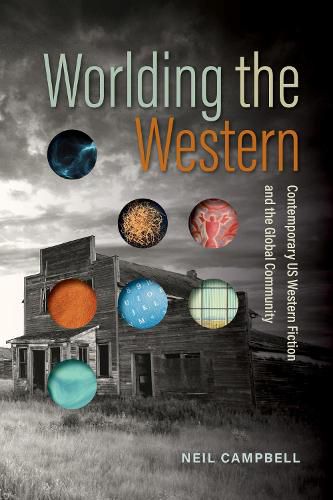Readings Newsletter
Become a Readings Member to make your shopping experience even easier.
Sign in or sign up for free!
You’re not far away from qualifying for FREE standard shipping within Australia
You’ve qualified for FREE standard shipping within Australia
The cart is loading…






Worlding the Western takes the fiction of the Western United States as a focal point for a re-examination of the consequences of exceptionalism and closed borders in the Trump Era. At a time of bounded individualism, new nativism, climate emergency, and migration crises, author Neil Campbell argues that fiction offers opportunities to put the world back in ways that challenge the dark side of globalization and proposes worlding as a different and more open form of politics. A driving force in the book is a comment from the philosopher Jean-Luc Nancy, who wrote the unity of the world is not one: it is made of a diversity, including disparity and opposition. It is made of it, which is to say that it is not added to it and does not reduce it. The unity of the world is nothing other than its diversity, and its diversity is, in turn, a diversity of worlds (The Creation of the World or Globalization, 2007, p. 109). Diversity, disparity, and opposition are central to the dynamic frictional fiction I consider in this book. The American West provides a powerful test case (a laboratory of the future in Charles Bowden’s term), in which these features - diversity, disparity, and opposition - are present and yet historically have often been so masked or denied in the rush towards unanimity and nation-building. In this book, the past is never lost or irrelevant, but rather circles around, re-emerging in lives as echoes and hauntings. Worlding is, therefore, a positive, critical concept through which to put the notion of a single world under pressure.
$9.00 standard shipping within Australia
FREE standard shipping within Australia for orders over $100.00
Express & International shipping calculated at checkout
Worlding the Western takes the fiction of the Western United States as a focal point for a re-examination of the consequences of exceptionalism and closed borders in the Trump Era. At a time of bounded individualism, new nativism, climate emergency, and migration crises, author Neil Campbell argues that fiction offers opportunities to put the world back in ways that challenge the dark side of globalization and proposes worlding as a different and more open form of politics. A driving force in the book is a comment from the philosopher Jean-Luc Nancy, who wrote the unity of the world is not one: it is made of a diversity, including disparity and opposition. It is made of it, which is to say that it is not added to it and does not reduce it. The unity of the world is nothing other than its diversity, and its diversity is, in turn, a diversity of worlds (The Creation of the World or Globalization, 2007, p. 109). Diversity, disparity, and opposition are central to the dynamic frictional fiction I consider in this book. The American West provides a powerful test case (a laboratory of the future in Charles Bowden’s term), in which these features - diversity, disparity, and opposition - are present and yet historically have often been so masked or denied in the rush towards unanimity and nation-building. In this book, the past is never lost or irrelevant, but rather circles around, re-emerging in lives as echoes and hauntings. Worlding is, therefore, a positive, critical concept through which to put the notion of a single world under pressure.